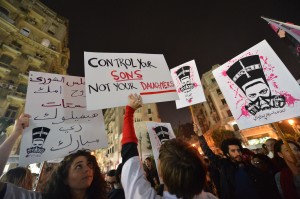
By Rana Muahammed Taha and Rawan Ezzat
Operation Anti Sexual Harassment (OpAntiSh) received more than 80 reports of sexual assaults in Tahrir Sqaure, during anti-Morsi mass protests on Wednesday.
An initial count of sexual assault cases reported since Friday in Tahrir Square alone reached 181 cases.
Women were reportedly beaten by sharp objects and knives on Wednesday, OpAntiSH reported through its official twitter account.
“We have intervened in more than 50 cases,” stated OpAntiSh. “The seriousness of the assaults ranged from mob sexual harassment and assault, to raping female protesters using knives and sharp objects.”
Marina Wasfy, a member in OpAntiSh, said: “seven of the victims required medical assistance after being attacked with knives.”
These incidents usually occur in public where the target could be easily reached and there is a lack of guardianship, said Wasfy.
OpAntiSh stated on Facebook: “Our team intervened in a case where a survivor of a horrific mob sexual attack was about to undergo a virginity test by a female doctor in a police booth inside Tahrir metro station,” said Wasfy. Anti-harassment groups were able to intervene before the test actually took place.
‘I saw Harassment’ initiative member, Fathi Farid said that two mob sexual assault cases were reported to the initiative at the presidential palace sit-in on Wednesday. Farid stated that the first assault involved four female victims and the second involved two. The initiative was able to positively intervene in both cases, Farid said.
Omar Ismael, a protester in Tahrir Square who witnessed an assault, said: “my friends and I were in Tahrir when we heard that a woman was being raped. We ran towards her, and found her surrounded by men. We tried reaching her, but it was impossible.”
“We tried to call OpAntiSh but the connection was bad.” Ismael said the woman was left naked after an hour of struggle and was rescued by an ambulance.
In a blog post released by Amnesty International on Wednesday, the human rights organisation stated the cases of sexual assault reported throughout the week are “a reminder of how successive Egyptian governments, including President Morsi’s, have failed to address gender-based violence and discrimination”.
The organisation, which expected the actual number of sexual assault cases to be much higher than that officially announced by OpAntiSH and other groups, held the now-ousted regime partially responsible for such attacks.
The organisation stated that the National Council for Women (NCW) had drafted a law on violence against women and sent it to the former president and prime minister. It added that the Ministry of Interior had established a violence-against-women department to address sexual harassment and violence against women. Amnesty International pointed out that neither initiative proved fruitful.
Amnesty International also blamed Morsi’s opponents for the sexual assault incidents. The organisation stated that the opposition called for mass protests yet failed to raise awareness or speak against sexual assaults “despite precedents”.
Cases of sexual assault and gang rape were reported during the second anniversary of the January 25th revolution and during protests against Morsi’s constitutional declaration in November 2013. Amnesty stated that a complaint filed to now former prosecutor general Talaat Abdallah by seven assault survivors from the aforementioned incidents was overlooked. It cited a lawyer working on the case saying that a prosecutor described it as “not being a priority” given the other more “serious crimes” he had to investigate.
Amnesty International said that impartial and independent investigations into all cases of mob sexual assaults and gang rape are in order.
“Sadly,” the organisation concluded, “regardless of what happens in Egypt in the next few days, a long road lies ahead in the struggle for equality.”
Correction: In an earlier version, the story quoted ‘I Saw Harassment’ initiative member Veronica Benjamin, saying: “the worst two cases were two women who were raped at the presidential palace.” Fathi Farid, another initiative member, said that the cases involved sexual assault and not rape.


